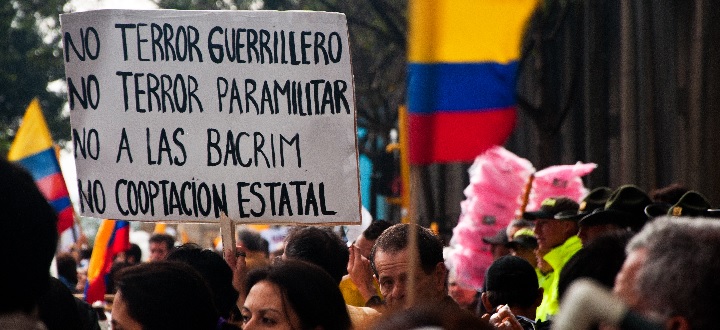How civil conflict has affected health services in Colombia
-
Research
- Health and Wellbeing
Posted on 13 March 2018
Research at York is helping health services in Colombia deal with the aftermath of the country's armed conflict

December 2011 - People line the streets of Bogota, Colombia to protest against the FARC rebel group
[The research] will provide a 'uniquely rich' portrait of the consequences of civil conflicts for health systems.
Our health economists are carrying out research in Colombia to explore the impact of civil conflict on the country’s health services.
Over 220,000 people died and more than six million people - 13 per cent of the population - were displaced in over 40 years of armed struggle.
A peace accord signed in December 2016 between the FARC rebel group and the Colombian government brought an end to the killing, kidnapping and bombing.
But health services in the country have been left to deal with a legacy of physical and mental health problems caused by the bombs and the bullets.
The research underway at York will look at:
- how the health of different population groups has been affected by the conflict
- how demands on health services have changed
- how services might have to adapt to cope with the population’s post-conflict needs.
The consequences of conflict
It will provide a “uniquely rich” portrait of the consequences of civil conflicts for health systems, says Dr Rodrigo Moreno-Serra from the University’s Centre for Health Economics.
He explained: “As well as physical injuries suffered by people caught up in the conflict, there are mental health problems for families dealing with bereavement and displacement.
“In the areas where the conflict was most intense, sometimes it was not possible for the Government to provide health services because it was too dangerous to work there. Or in some cases, the rebel forces set up their own healthcare services. Following the ceasefire, these now no longer exist, so there are areas of the country where there is currently very limited provision. Services will have to be re-established in some areas.”
Researchers at York will work on the 30-month project with academics from Escuela de Gobierno, Universidad de los Andes in Bogota and the London School of Hygiene and Tropical Medicine. Researchers from our Department of Politics will also be involved.
Evidence-based decisions
The research will enable evidence-based health policy decisions to be taken in Colombia - and may offer insights for other conflict-affected countries.
“There’s been very little research into what happens after conflict. We know that inevitably, people are going to die and be injured, but there are other consequences including people turning to alcohol or being affected by depression,” said Dr Moreno-Serra.
“Even if people have not been directly affected, their livelihoods may have been destroyed or they may have had to move to new urban areas which breaks family connections and social networks - all these things can affect people’s health.
“The conflict in Colombia is not like the acute situation in Syria or Iraq where infrastructure in many towns and cities has been completely destroyed. Throughout the decades of conflict, Colombia managed to maintain a functioning health system - the country is not starting from scratch. The issue is more about how it should adapt to meet health needs that are now becoming more apparent.”
The project will also look at the impact on some of the country’s lowest income groups, often living in rural areas with limited access to health facilities.
Health budgets
The answer, Dr Moreno-Serra says, will not always be more money. “Compared to other countries in Latin America, Colombia is not doing too badly in terms of health service provision. There are pockets of excellence for example in cities such as Bogota where there is relatively high spending on high tech hospital equipment. But it could be that, post-conflict, there is a case for spending some of this money on primary care and in other areas of the country.
“The issue could be more about spending the same overall budget in a better way.”
Dr Oscar Bernal, Associate Professor at Escuela de Gobierno who will be working with the York researchers, said Colombia now has a historic opportunity to build peace.
“We at Universidad de los Andes are committed to participate in a joint effort with our UK colleagues to generate evidence and propose policies to improve the quality of life of all Colombians who have endured more than 40 years of conflict.”
War and Peace - the Health and Health System Consequences of Conflict in Colombia is jointly funded by the UK Department of International Development (DFID), the Economic and Social Research Council (ESRC), the Medical Research Council (MRC) and Wellcome
The text of this article is licensed under a Creative Commons Licence. You're free to republish it, as long as you link back to this page and credit us.

Dr Rodrigo Moreno-Serra
Research interests in the fields of health economics, global health and development economics
Discover the details
- Find out more about the work of our Centre for Health Economics
- Explore our Global Health research
Explore more research

A research project needed to spot trees on historic ordnance survey maps, so colleagues in computer science found a solution.

We’re using gaming technology to ensure prospective teachers are fully prepared for their careers.

A low cost, high-accuracy device, could play a large part in the NHS's 'virtual wards'.
